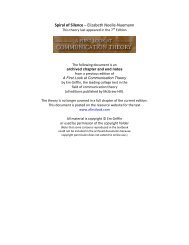Interpersonal Deception Theory (PDF) - A First Look at ...
Interpersonal Deception Theory (PDF) - A First Look at ...
Interpersonal Deception Theory (PDF) - A First Look at ...
- No tags were found...
Create successful ePaper yourself
Turn your PDF publications into a flip-book with our unique Google optimized e-Paper software.
CHAPTER 7: lNnl\PERSONItL DECEPTION TllEOl,y107The question is whether simple constructions can reflect the complexity of real-lifedeceptive give-and-take. Buller and Burgoon are convinced th<strong>at</strong> they can't. Theyinsist th<strong>at</strong> deception is essentially a comm1l71ic<strong>at</strong>ioll activity so th<strong>at</strong> theory and researchabout it must take into account all the intricacies of face-to-face interactionYWhile not denying th<strong>at</strong> Buller and Burgoon capture much of th<strong>at</strong> complexityin their 18 propositions, University of Virginia psychologist Bella DePaulo and hercolleagues fail to spot an explan<strong>at</strong>ory glue th<strong>at</strong> binds them together:We cannot find the "why" question in Buller and Burgoon's synthesis. There is nointriguing riddle or puzzle th<strong>at</strong> needs to be solved, and no central explan<strong>at</strong>orymechanism is ever described. With no conceptual motor to drive their synthesis,there is il!sO no new understanding. 2HSince a social science theory should explain as well as describe, these critics questionwhether interpersonal deception theory is really a theory <strong>at</strong> all.In response to this criticism, Buller and Burgoon argue th<strong>at</strong> the theory doesexplain-th<strong>at</strong> they offer multiple mechanisms to link the many variables th<strong>at</strong> affectinterpersonal deception. They suggest th<strong>at</strong> expectallcy viul<strong>at</strong>iolls could be the unifyingfactor in the theory (see Chapter 6). Expectancy viol<strong>at</strong>ions would explainhow people recognize deception-a respondent becomes suspicious when the deceiverbegins to act in a strange way.29 But since only a few of the theory's propositionsrefer to expectancy viol<strong>at</strong>ions, the unity (and st<strong>at</strong>us) of the theory remainsin question.Fur me, the power of interpersonal deception theory is found in its practicaladvice. Wilen talking ·with others, we should doubt our ability to detect deception. Mostof us think we are gre<strong>at</strong> lie detectors. But because deceivers have the chance to adjusttheir communic<strong>at</strong>ion in a way th<strong>at</strong> will allevi<strong>at</strong>e our suspicions, we reallyaren't. Once we no longer assume th<strong>at</strong> we have an uncanny knack for ferreting outthe truth, we decrease the danger of making snap judgments th<strong>at</strong> do violence toothers. I once heard a macho teenager boast th<strong>at</strong> he could tell whether a girl wasa virgin by looking into her eyes, regardless of wh<strong>at</strong> she said. Th<strong>at</strong>'s the kind ofarrogance th<strong>at</strong> could easily besmirch a reput<strong>at</strong>ion.Even when we understand th<strong>at</strong> falsific<strong>at</strong>ion, concealment, and equivoc<strong>at</strong>ionare interpersonal facts of life, it still may make sense to maintain our truth bias. Weusually want others to be honest with LIS, and self-fulfilling prophecy is a strongdynamic in any convers<strong>at</strong>ion. People who expect honesty from others have a betterchance of getting it than do those who doubt everything th<strong>at</strong>'s said. Instead ofacting like the suspicious f<strong>at</strong>her played by Robert DeNiro in Meet the Parents andMeet the Fockers, I'd r<strong>at</strong>her be a person who "believes all things, hopes all things,endures all things."JO Until such time th<strong>at</strong> 1run across solid evidence th<strong>at</strong> anotherperson is trying to deceive me, I prefer to relax and enjoy our convers<strong>at</strong>ions.To summarize, interpersonal deception theory underscores the complexity ofdeception when people talk and respond to each other face-to-face. It's hard toknow for sure when someone isn't telling the truth. But before the difficulty of detectionprompts you to lie to P<strong>at</strong>-or anyone else, for th<strong>at</strong> m<strong>at</strong>ter-consider thethoughts in the brief ethical reflections th<strong>at</strong> follow this chapter. Buller and Burgoonmay be silent about the morality of deception; ethica1theorists are not.
















